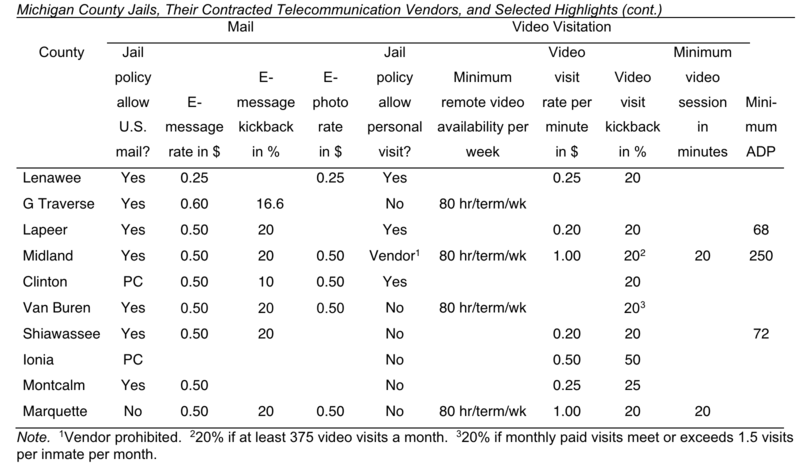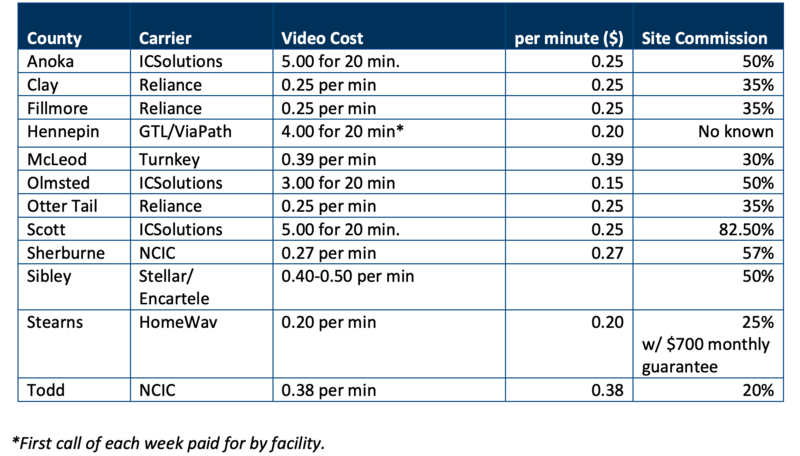Recent data offer a detailed snapshot of the cost of family contact in local jails
Some of the questions we receive most often about communication policies (and rates) in local jails can finally be answered, thanks to two new resources from Michigan and Minnesota.
by Wanda Bertram, April 11, 2024
How many jails have eliminated in-person visits? How much of a kickback does your average jail get from its telecom providers? How common are tablets in jails and what fees do incarcerated people pay to use them? Because the thousands of local jails in the U.S. are independently run, it’s hard to get comprehensive data to answer questions like these. So it’s encouraging to see two resources get published — out of Michigan and Minnesota, respectively — that will help fill the gap. I summarized my own takeaways from these reports in this blog post.
In Michigan, independent researcher Phil Lombard (using data obtained by requesting jail phone contracts in 40 counties) produced detailed spreadsheets showing the rates county jails are charging incarcerated people and their families for a variety of communication services, and the kickbacks these counties get from their providers. And in Minnesota, following the state legislature’s move last year to make prison phone calls free, the state Ombuds for Corrections published a report in September with similar data from 26 county jails, proving the necessity of reform for jails as well as prisons.
Both of these resources draw on a large and diverse sample of counties — large and small, urban and rural, and geographically varied — making it possible for researchers and activists to generalize from their findings about the state of telecommunications policy in local jails.
So what do the data show?
Video calling and e-messaging costs are desperately in need of regulation.
In both Michigan and Minnesota jails, the cost of these non-phone services vary widely. A 20-minute video call in Minnesota can cost between $3 and $10 (equating to as much as $0.50/minute); in Michigan, between $3 and $20 (or as much as $1/minute). E-messaging in both states ranges from just 9 or 10 cents per message to a bizarre $2 per message. As we have pointed out before about phone calls, the wide range of rates for these services is due to the fact that companies set prices based on profit-seeking, rather than on the cost of delivering the services.
Thanks to the Martha Wright-Reed Act passed by Congress last year, which confirmed the FCC’s authority to regulate video calls, the agency is required to hand down the first national video calling regulations sometime this year. And while e-messaging is still not subject to federal agency regulation, states have the power — either through legislation or through their public utilities commissions — to set rate caps for these and other telecom services. These reports should make it clear to the FCC and to states that regulating video calling and e-messaging is an urgent matter of consumer protection.
In-person visits and physical mail are disappearing in jails.
In Michigan, coincidentally, a coalition of public interest law firms is currently suing St. Clair and Genesee counties for their practice of banning visits and then cashing in on greater kickbacks from video calling. The new data show that this practice is not a novelty, but the norm in jails today.
A staggering 33 out of 40 jails in the Michigan sample have banned in-person visits (with one, Midland County, noted as having canceled visits specifically at the request of its video calling vendor, Securus). In addition, 20 out of 40 jails have either banned physical mail — following an example set by a disturbing number of state prisons — or restricted families to only sending plain postcards. The Minnesota report is not specific about which jails have banned visits or mail, but notes that “more than half the sample counties we surveyed do not allow in-person visits other than with an attorney.”

The costs families pay would drop dramatically if jails didn’t take commissions.
Some of the most valuable data in these two new reports are the numbers showing that a substantial amount — even, in some counties, the majority — of the money families pay to telecom companies is directly kicked back to the counties themselves.
The Minnesota Ombuds for Corrections’s report provides detailed data tables showing how much families are charged for phone calls, video calls, e-messaging, and voicemail in various counties; as well as how much the counties that offer these services are taking in commissions. Some basic math shows that these kickbacks account for a significant amount of the rates families pay. For instance, the average commission paid to jails for video calling is 39% of total revenue. Vendors build these commissions into their rates, meaning that if jails did not demand these commissions, they could negotiate much lower rates with their providers. The typical Minnesota jail, which charges 29 cents per minute for video calling, could charge just 18 cents per minute if it refused commissions.

Similarly, the Michigan dataset presents commission amounts for a variety of telecom services in many of the 40 sample jails. The average kickback paid to counties for video calling is 32% of total revenue. The average rate families pay to talk to their loved ones via video chat in these jails is 54 cents a minute, but if jails refused commissions, that average would drop to 36 cents per minute.
These two resources also offer insights into aspects of jail telecommunications we haven’t covered in depth before, which advocates might find useful. For instance, the Minnesota report highlights that tablets in some Minnesota jails are being rented to incarcerated people for a weekly or monthly fee, in addition to the well-known fees people pay to use the services on the tablets. And both resources show that people are paying steep fees for voicemail services: For the privilege of leaving an incarcerated loved one a voicemail that typically lasts a minute or less, families are paying around $1.50 on average and as much as $3.95.
These two new resources provide valuable data about jail communication policies and the urgent need for jail phone justice. I hope they will inspire federal and state regulators to take note.



